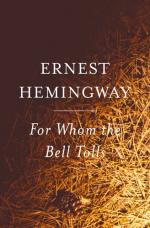|
|
For Whom the Bell Tolls Chapter 18
Robert Jordan compares the situation to a merry-go-round; they keep turning, twice now, get nowhere, and win no prizes. He is working on his sketches when Maria stands over him, and he smells her skin. He resents being dragged into the business with Pablo. When he talks to Pablo, who is working on the retreat, it is very tense and barely stays civil, and Agustín is the same way. Pilar watches the men play cards. He observes, "Here it is the shift from deadliness to normal family life that is the strangest." Chapter 18, pg. 228
Two days ago, his world was simpler. Now that Maria is in his life, the plan must change, and she will wait for him while he is there. He expected to get time off after the bridge and go to Madrid, the capital, where he will stay at a hotel and get a hot bath and absinthe. He planned to talk to Karkov about the war at Gaylord's, a hotel the Russians took over. He is embarrassed that there he enjoys food too good for a besieged city. He knows that he could not take Maria there without first telling Karkov about her. At first he was repelled by the air of luxury and corruption, but then enjoyed it. At Gaylord's one met famous Spanish commanders. They were once peasants and workers who spoke Russian, having fled to Spain when the 1934 revolution failed. He learned that a leader known as El Campesino, or The Peasant, was really an ex-sergeant who had deserted the Spanish Foreign Legion. One must have peasant leaders, Robert Jordan thinks. Gaylord's is the place where he needs to complete his education, and someday he will tell the truth to everyone. It is a long way from Gaylord's to the cave, longer from the cave to Gaylord's.
At Gaylord's, Kashkin introduced him to Karkov, who was the most intelligent man he had ever met. Kashkin is not well liked there, and was in Spain to work something out, what, Robert Jordan does not know. Karkov has good taste in women: a wife who is incredibly thin, dark, loving and nervous, and a mistress who is more sensual, gossipy, with reddish hair. Golz will make fun of him about Maria, after he told him that he had no time for women. He looks over at Pablo and wonders what kind of a guerrilla leader he would have been during the American Civil War. He sees that there are no big heroes and no military geniuses. All of the leaders follow dual controls, using a great deal of what they learned from the Russians, but soon they will have to fly solo. He wonders what the Russian stand is on the whole thing, and hopes to learn at Gaylord's. He compares being there to being in a crusade, a feeling of achieving a duty toward the oppressed, a brotherhood, as inspiring as being in a cathedral, a pure feeling which disappeared after six months of fighting. He has seen discipline enforced: men who ran as cowards were shot and their valuables stolen. He remembers how it feels to fight: "You learned the dry-mouthed, fear-purged purging ecstasy of battle and you fought that summer and that fall for all the poor in the world against all tyranny, for all the things you believed in and for the new world you had been educated into." Chapter 18, pg. 236
He knows that with his initial naiveté and selfless pride, he would have been a bore at Gaylord's. He and Karkov have talked about the days before Gaylord's, where everyone felt so lost that even the government abandoned the city. Karkov was responsible for hiding three wounded Russian soldiers so that the fascists would not find out about Russian intervention. If the city were to be abandoned, Karkov would poison the soldiers and eliminate their existence. He even has cyanide for himself. Robert Jordan wonders how people keep their chastity of mind in the war, and considers Karkov. There was a British economist, Mitchell, who Karkov liked very much, telling him about how everybody trusts the man; because he looks impressive, people do not see he is a fool. He gets money from the government of one nation by falsely claiming his connections to a larger, more threatening nation. Robert Jordan does not like it and Karkov says it is only important that he understands it. Karkov is for political assassination when the leader is unfaithful to his trust, and tells him that the Spanish will live to regret that they did not shoot certain generals. Karkov knows he is reliable in his work, and wants to speak seriously about politics, but Robert Jordan tells him that his mind is suspended until after the war. They discuss how even reading twenty newspapers does not give a full picture of the war.
Karkov knows they are building a dangerous army, one with many unreliable people, without true army discipline. Robert Jordan says he likes it better behind the enemy lines than in the cities, where the "fine people" live. Karkov tells him that the fascists have fine people behind their lines as well. He then leaves to go upstairs and continue talking. Robert Jordan knows he learns a lot at Gaylord's. Karkov wrote a two thousand-page novel which was not a success, and he tells things to Robert Jordan because he knows that the man writes honestly. Robert Jordan thinks to himself that the things he has come to know in the war are not simple.




